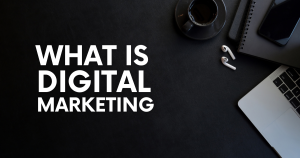
In today’s fast-paced, technology-driven world, traditional marketing strategies have taken a backseat to digital marketing. Whether scrolling through your favorite social media platform, reading blogs, or searching for information online, digital marketing plays a critical role in shaping what you see, hear, and engage with. But what exactly is digital marketing, and why is it so important?
Defining Digital Marketing
At its core, digital marketing refers to any marketing effort that utilizes the internet or electronic devices. It’s a broad term that encompasses a variety of strategies aimed at reaching customers online, from social media marketing and email campaigns to search engine optimization (SEO) and pay-per-click (PPC) advertising.
Unlike traditional marketing methods like TV ads or billboards, digital marketing allows businesses to directly engage with their target audience in real time, measure the success of their efforts, and make data-driven decisions to improve their campaigns.
Key Components of Digital Marketing
- Search Engine Optimization (SEO)
SEO is all about improving a website’s visibility on search engines like Google. When a potential customer searches for something related to your business, SEO helps ensure that your website appears as high up in the search results as possible. It involves optimizing your content with relevant keywords, improving website speed, creating quality backlinks, and ensuring a seamless user experience. - Content Marketing
Content marketing involves creating and distributing valuable, relevant content that attracts and engages a specific audience. It can take many forms, including blog posts, videos, infographics, eBooks, and more. By providing helpful content, businesses can build trust with their audience, establish themselves as industry leaders, and drive organic traffic to their websites. - Social Media Marketing
Platforms like Facebook, Instagram, Twitter, LinkedIn, and TikTok have become key players in digital marketing. Social media marketing is about creating and sharing content on these platforms to increase brand awareness, engage with followers, and drive traffic to your website. It also allows businesses to run targeted ads based on user demographics, interests, and behavior. - Email Marketing
Email marketing remains one of the most cost-effective ways to nurture leads and convert them into customers. It involves sending out newsletters, promotional offers, and personalized content directly to your audience’s inbox. The key to successful email marketing is delivering relevant content that resonates with your audience, ensuring high open and click-through rates. - Pay-Per-Click (PPC) Advertising
PPC advertising is a paid form of digital marketing where advertisers pay a fee each time their ad is clicked. These ads are typically shown on search engines (like Google) or social media platforms (like Facebook or Instagram). The advantage of PPC is that it provides immediate visibility and can drive traffic quickly, making it an excellent strategy for businesses looking to generate leads and sales fast. - Affiliate Marketing
Affiliate marketing is a performance-based strategy where businesses pay a commission to affiliates (partners or influencers) who drive traffic or sales to their website through unique affiliate links. It’s a popular method for eCommerce and online businesses to leverage the influence of others to reach a broader audience. - Influencer Marketing
With the rise of social media, influencer marketing has become a powerful way for brands to promote their products or services. By partnering with influencers—individuals with a significant and engaged following—businesses can reach a wider, more engaged audience and create authentic connections through trusted recommendations.
Why is Digital Marketing Important?
The digital age has transformed the way businesses and consumers interact. Here are a few reasons why digital marketing is crucial:
- Cost-Effective: Digital marketing offers affordable and scalable solutions for businesses of all sizes. Whether you’re a small startup or a large corporation, you can reach a global audience without breaking the bank.
- Measurable: Unlike traditional marketing, digital marketing provides real-time analytics that show exactly how campaigns are performing. This data allows businesses to make adjustments quickly and efficiently, maximizing their return on investment (ROI).
- Targeted: Digital marketing allows for precise targeting. Businesses can tailor their ads to specific demographics, behaviors, and interests, ensuring their message reaches the right audience at the right time.
- Interactive: Engagement is key in today’s marketing world. Digital marketing provides opportunities for two-way interaction, allowing customers to engage with brands, ask questions, and provide feedback instantly.
- Scalable: Digital marketing allows businesses to scale their campaigns. With various platforms and tools, brands can start small and expand their efforts based on what works.
Conclusion
Digital marketing is an essential part of any modern business strategy. It not only helps businesses reach a broader audience but also offers tools and techniques to measure, optimize, and personalize marketing efforts. Whether you’re just starting or looking to refine your current marketing strategy, embracing digital marketing is key to growing your business in today’s digital-first world.

